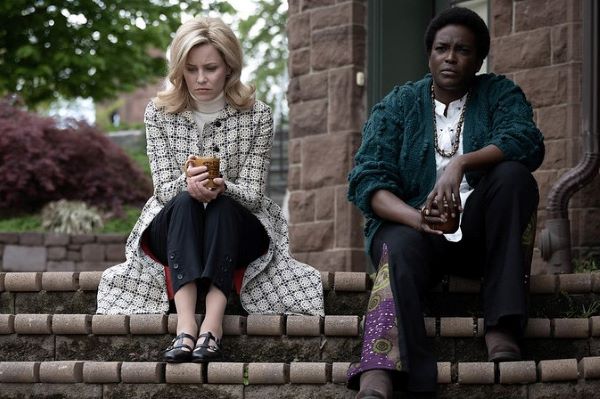With the bodily autonomy afforded by the verdict of the Roe v. Wade case under assault 49 years after it guaranteed the right to an abortion, Phyllis Nagy’s Call Jane is a drama with a desperate sense of urgency. Set in Chicago in 1968 it offers a sobering depiction of a time when it was impossible for women to access safe terminations legally. Fortunately, there was the Jane Collective. Affiliated with the women’s liberation movement in Illinois, it was an underground network that risked much to provide help to those that required it. It’s a clear-eyed, direct work that remains affecting even if it flattens its dramatic sensibility into one specific character arc.
We meet the ‘Janes’ through Joy (Elizabeth Banks), a perfect 1960s wife and mother, devoted to her family and happily pregnant once more. That is until she receives a diagnosis of cardiomyopathy, which gives her an even chance of dying in childbirth. For her doctor, it’s simple: “You cannot be pregnant,” he says. However, an extraordinary appeal to the hospital board of directors doesn’t come to the same conclusion. Then she meets the Janes, and a journey of politicisation and self-fulfilment from patient, to activist, and then a fully-fledged, glamorous Vera Drake.
Banks, better known as a gifted comic actress, thoroughly convinces throughout Joy’s evolution. It isn’t a grandstanding performance, but shines through in a subtle shift in posture and inner steel. Chris Messina and Kate Mara are slightly less-well served as Joy’s curiously oblivious husband (Joy tells him she’s been attending ‘art class’) and Republican next door neighbour, who seems like an intriguing foil for Joy’s awakening, until she suddenly vanishes for most of the narrative. The most chewy role goes to a formidable Sigourney Weaver as Virginia, the head of the collective. Weaver grabs the best role she’s had in ages with gusto as a fiercely driven woman whose utter commitment and iron resolve has made her adept at getting what she wants, even if that involves mind games and emotional manipulation.
For the most part, Call Jane is more about character than plot. Unconcerned with the deeper, seismic discourse around the moral quandaries of abortion, Nagy instead sets the Jane Collective within the wider context of global activism and creep towards progressivism in that especially turbulent year of 1968. For the previously small ‘C’ conservative, culturally Christian Joy, it’s as simple as the fact that they quite likely saved her life, and she feels indebted to pay that good fortune forward to others. And there are many. Teenage girls and younger, victims of rape, women with large families who can’t afford an other mouth to feed. With limited means, the tension comes not from Janes’ actions and its then illegality, but in what circumstances are most deserving of their services.
For such an urgent and potentially divisive subject, it’s actually surprising just how low stakes Call Jane feels. There are mentions of the Mafia being paid off, and the precautions taken to protect the secrecy of the operation. But apart from this lip service, the expected intervention of the police never occurs (a brief appearance by First Cow‘s John Magaro as a Serpico-like vice cop is as close as we get). Nor does the expected instance of a procedure going wrong. Not even the discovery of Joy’s activities by her family ignites the touch paper. Nagy’s narrative is staunchly wedded to the message. But that’s not to say that it’s always an easy ride. Nagy doesn’t shy away from just how harrowing Joy finds her procedure, and there’s the reliance of Virginia on shady unqualified doctor Dean (Cory Michael Smith) for his services which provides some interesting ideological meat (and one particularly silly scene in which Virginia seduces him in exchange for some free terminations).
Despite Call Jane‘s propensity to keep its narrative on a dramatic simmer, it is brisk viewing, and makes light of its two hour length. Deft, charismatic performances find depth in Nagy’s straight-forward, candid approach to writers Hayley Schore and Roshan Sethi‘s script. Perhaps this light touch with the material will ensure that a wider audience will engage with the potentially difficult subject matter. It will certainly be interesting see how it compares with Tia Lessin and Emma Pildes‘ documentary on the same subject, which is also screening at the festival.
Screening as part of Sundance Film Festival 2022
